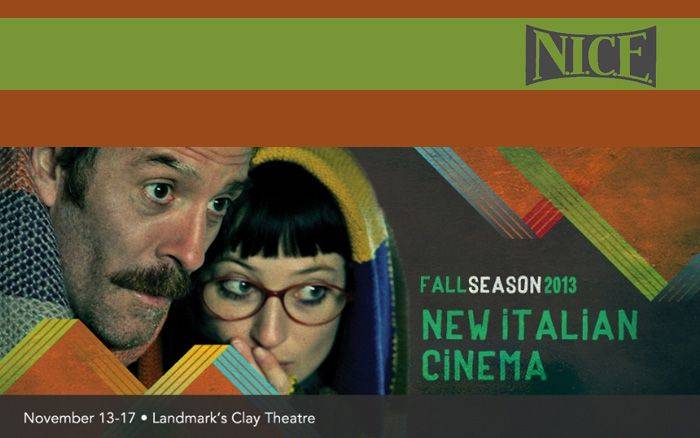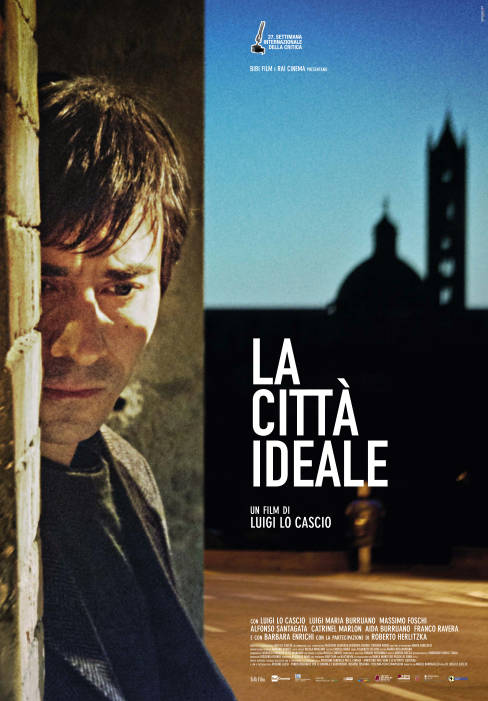Presenting the 23rd Edition of N.I.C.E.
N.I.C.E. New Italian Cinema Events, the Italian film festival directed by Viviana del Bianco
and Grazia Santini, is back in the United States for its 23rd N.I.C.E. USA edition. The series of eight new Italian films by debuting directors premiered in New York City at Tribeca Cinemas on November 11th and it will end on the 14th. Then it will move to San Francisco (November 13th-17th at the ClayTheatre) and to Philadelphia (December 5-8).
This year's theme is here summed up by the words of the organizers: “Italian society is forced to face the problem of unemployment which is increasing every day: it is now very difficult to keep a job or to find a new one, to receive the uninterrupted flow of people fleeing poverty, the horrors of war, persecution, or to control and adapt to the new technologies that are changing the rhythm of our lives both financially and humanly. Our relationship with nature is also becoming increasingly difficult to control: climate change causes flash floods, earthquakes destroy our cities and our most industrious towns, causing the "disorientation" of thousands of people; not to mention our political situation which contributes to enhance all kinds of social tensions... All of this, in the last decade, has had a great influence on the themes of the films that we have presented in our film series. Our all-time custom is to showcase films that take into account a variety of genres. Coincidentally, not only dramas, but also bright and lightweight comedies have nowadays the tendency to highlight our country's social, family and political struggle, by offering our audiences an opportunity for a deeper knowledge of our reality and for reflection, in addition to pure entertainment.
Unfortunately, for all the reasons mentioned above, our 23rd festival in San Francisco, which we had hoped it could be stronger than usual to celebrate the Year of the Italian Culture in the United States, will be reduced in the number of days of programming and screenings. The quality of our selection, however, is unchanged, therefore none of the films presented should be missed!”
The following are the films that can be ejoyed at N.I.C.E.: The Ideal City, the film debut of actor Luigi Lo Cascio as a director, is the harsh recount of the vicissitudes of one great environmentalist, who moves from Palermo to Siena in Tuscany, to denounce civil unconsciousness, judicial drifts, social indifference, and the gear of the public system and order. The film portrays the difficulties to stick to the truth and how the simplest situations can lead to misunderstandings of all kinds. A film echoing Francesco Rosi's civic engagement and Leonardo Sciascia's indignation and moral tension.
Out of the Blue, the second feature film by Edoardo Leo, is a brilliant comedy featuring a great cast: the story starts off with the surprise arrival of an unheard-of daughter, unexpected by her father, a young and rampant man, rather selfish, who gradually improves himself by becoming a tender heart. Several entertaining twists keep the audience enthralled.
Cosimo and Nicole, the second feature film by Francesco Amato, was born from the desire to tell the wandering life of a young couple facing today's problems in Europe. Compelling, romantic and by no means trivial, the story showcases a fresh idea of cinema that is free from any labels or sense of nationalism, providing an unconditioned and personal look.
Balancing Act, the second feature film by Ivano De Matteo, shows how ephemeral the boundary between wealth and poverty can be, when tragic and sometimes ironic events disrupt the rhythm of a man's quiet family life, following his mistake of betraying the trust of his loved ones.
Alì Blue Eyes, the second feature film by Claudio Giovannesi, portrays the difficulties arising in today's multi-ethnic society and the vitality and complexity of adolescence, exacerbated by a turbulent quest for identity. Nader, an Egyptian boy born in Rome, is stuck between the laws of religion and the ones of his father, between the rules of the past and the Western culture of the Italian present. The love for an Italian girl, which he lives almost in secret and against the banning of his parents, affects Nader's choices, who somehow becomes an emblem for the troubles faced by a second-generation immigrant.
The Interval, Leonardo Di Costanzo's film debut, is the story of a broken love, a trampled poetry about the troubles of two teenagers, taken hostage in an old and abandoned hospital of Naples and waiting for the boss to arrive and determine the girl's fate. A cross-section of the violent suburbs of a contemporary Italian metropolis. A film to be also seen and appreciated for Luca Bigazzi's exceptional photography.
Steel, Stefano Mordini's debut film based on the novel by Silvia Avallone, deals with the transition from childhood to adolescence of two beautiful girlfriends. The theme itself is delicate, but it becomes more difficult to deal with within the industrial context of the suburbs of Piombino. A series of fascinating shots highlights the contrast between the beautiful sea overlooked by Piombino's steaming chimneys and the Island of Elba, somehow both near and far. The grueling work pace in the steel, the forced choice between work and health and the discovery of love are the main themes of this film, in which the steel remains the undisputed leading character.
There Will Come a Day, by Giorgio Diritti, enacts a series of universal questions about the meaning of life. The film follows the inhabitants of the Manaus favelas, which function as background for the painful story of a 30-year-old woman, interpreted by talented Jasmine Trinca. The sense of her research comes through loud and clear as the pain fades in the awareness of human precariousness and in her harmony with “the last of the Earth”. Contemplative in the first part, overwhelming like the flood in the end. Stunning photography.
In addition to the eight films presented in competition, this year's festival features a series of special events: in New York and San Francisco the series opened, and will open, with the latest work of Silvio Soldini Garibaldi's lovers, in nomination for the Donatello Award and Nastri d’Argento. Furthermore, in collaboration with Teatri Uniti, the festival in San Francisco will present a film series by a selection of Neapolitans directors: Paolo Sorrentino, Stefano Incerti, Mario Martone and the collective film Napoli24, all testifying the continued vitality of Neapolitan cinema.








































i-Italy
Facebook
Google+
This work may not be reproduced, in whole or in part, without prior written permission.
Questo lavoro non può essere riprodotto, in tutto o in parte, senza permesso scritto.